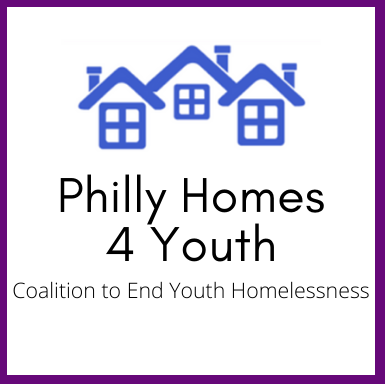About the Coalition
Our Mission
No young person should be without a home. The mission of the Philly Homes 4 Youth Coalition is to assure that every youth and young adult experiencing housing instability obtains a stable place to live with appropriate supportive services, and to assure that effective prevention and diversion strategies are implemented by public and private agencies to prevent youth homelessness in Philadelphia.
Our Vision
The Philly Homes 4 Youth Coalition envisions an affirming, equitable, and safe community where young people live autonomous, independent, self-sufficient lives, and where youth and young adults have low-barrier access to livable wages, affordable housing, and inclusive, youth-centered supports.
Our History
In 2016, the Philadelphia Office of Homeless Services (OHS), the assistance of the Rapid Results Institute, developed the 100 Day Challenge to End Youth Homelessness.
Facilitated by a newly-created staff position dedicated to planning around youth homelessness, the 100 Day Challenge involved over 30 provider agencies providing services to homeless youth and young adults; several city agencies, including the Departments of Human Services and Behavioral Health and Intellectual Disabilities, the Juvenile Probation Office, the Philadelphia Housing Authority, and the Managing Director’s Office; the School District of Philadelphia; and the newly-established Young Adult Leadership Committee (YALC), members of which co-chaired the process with the OHS youth homelessness coordinator.
The 100 Day Challenge created several subcommittees to focus on five specific areas where recommendations would be developed. They were:
- Coordinated Entry
- Prevention, including transition planning for dependent and delinquent youth
- Housing
- Mental Health
- Communications
The Coalition members united around an overarching recommendation: that ending youth homelessness in Philadelphia required an unprecedented level of collaboration and mutual support among city health and human service agencies and private service agencies, as well as support from private sector businesses, the media, academia, other community institutions, and young people with lived experience of homelessness themselves.
In that context, the 100 Day Challenge process unanimously agreed to an extensive array of specific recommendations for immediate and longer-term enhancements to interagency collaboration, policy and practice within various public agencies. Primary among these recommendations were:
- Improvements to DHS policy and practice related to youth transitioning out of foster care, youth eligible for extended care, and youth returning to care;
- Improvements to service planning for delinquent youth in the Juvenile Probation Office and Family Court;
- Expansion of the School District’s resources to address the needs of the thousands of students who experience homelessness every year (as indicated by the Youth Risk Behavior Survey);
- Initiation of new and flexible access to youth-sensitive mental health, substance abuse, and intellectual disability services;
- Enhanced access to critical documents needed by youth to move toward adulthood, including birth certificates, legal identification, etc.
At the conclusion of the 100 Day Challenge process, the members of the committees agreed that the work of assuring implementation of the recommendations of the Challenge required ongoing planning and advocacy. They unanimously agreed to form the Philly Homes 4 Youth Coalition to continue their advocacy to OHS and other city agencies in implementing the recommendations and assuring a robust response to the crisis of homelessness among youth and young adults in Philadelphia.
